
Key Takeaways:
- peaq and Pulsar Group are launching the Machine Economy Free Zone in Dubai to foster AI and robotics integration within decentralized economies.
- The initiative enables DePIN innovation and machine tokenization, including revenue-sharing models like the Universal Basic Ownership (UBO) system.
- The UAE strengthens its leadership in tokenization with billions in blockchain-based real estate transactions and supportive regulatory reforms.
Layer-1 blockchain platform peaq has partnered with Pulsar Group, an Abu Dhabi-based advisory firm, to launch the Machine Economy Free Zone in Dubai.
This new initiative aims to integrate robotics and artificial intelligence into a decentralized economic framework.
Announcing: the Machine Economy Free Zone — United Arab Emirates 🇦🇪
— peaq (@peaq) June 11, 2025
Welcome to the world’s first sandbox environment for a human-centric Machine Economy as envisioned by peaq and Pulsar
🔗 https://t.co/oRWSQaqeye
A place where humans and machines co-exist, co-create value, and…
The zone provides regulatory support, infrastructure, and funding to accelerate innovation, particularly around Decentralized Physical Infrastructure Networks (DePINs).
According to peaq co-founder Max Thake, the goal is to build a human-centric economy where autonomous machines generate value and share it transparently.
Several projects on peaq are already operating in the UAE, including community-driven air quality tracking, localized weather prediction, a virtual power plant, and noise pollution monitoring.
A major focus is machine tokenization, allowing tokenholders to earn revenue from machine-based services.
Thake cited a robotic café that reports sales on-chain, with each sale potentially rewarding tokenholders.
This model supports peaq’s Universal Basic Ownership (UBO) system, aimed at redistributing wealth from automation to those displaced by machines.
The World Economic Forum estimates the DePIN market could reach $3.5 trillion by 2028.
Meanwhile, the UAE continues to lead in tokenization, with Dubai’s Virtual Asset Regulatory Authority (VARA) updating its framework to support real-world asset (RWA) tokenization – highlighted by billion-dollar real estate deals on blockchain, backed by the Dubai Land Department and Central Bank of the UAE.

